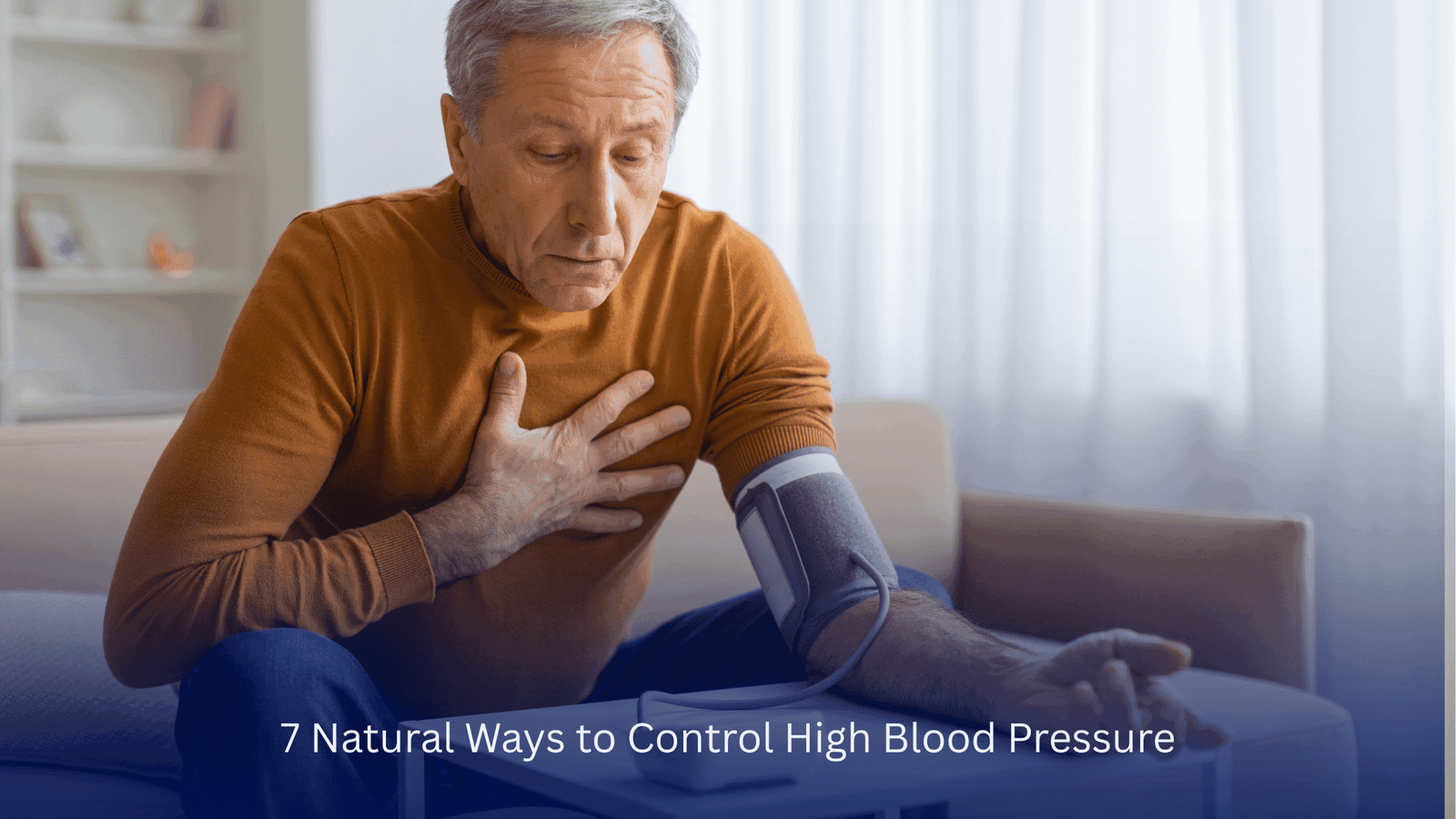7 Natural Ways to Lower High Blood Pressure
High blood pressure, also known as hypertension, is a silent killer. Often without noticeable symptoms, it can quietly damage your heart, arteries, and other organs. Fortunately, lifestyle changes and natural remedies can help manage and even reduce high blood pressure without relying solely on medication. This blog will explore seven scientifically supported, natural strategies to control hypertension and promote overall heart health.
Understanding High Blood Pressure
Blood pressure is the force of blood pushing against the walls of your arteries. It’s measured using two numbers:
- Systolic pressure (top number): pressure during heartbeats
- Diastolic pressure (bottom number): pressure between beats
A reading of 120/80 mmHg is considered normal. Hypertension is diagnosed when blood pressure consistently exceeds 130/80 mmHg.
Unchecked high blood pressure increases your risk of heart attack, stroke, kidney disease, and vision problems. That’s why it’s crucial to take early action.
1. Adopt a Heart-Healthy Diet
Diet plays a pivotal role in controlling blood pressure. Here’s what you should focus on:
a. Follow the DASH Diet
The Dietary Approaches to Stop Hypertension (DASH) diet is rich in:
- Fruits and vegetables
- Whole grains
- Low-fat dairy
- Lean protein (fish, chicken, beans)
- Nuts and seeds
b. Reduce Salt Intake
Excess sodium causes your body to retain water, increasing blood pressure. Aim for less than 1,500 mg of sodium per day. Tips:
- Avoid processed foods
- Read food labels
- Cook at home using herbs instead of salt
c. Eat More Potassium-Rich Foods
Potassium helps balance sodium levels and reduces pressure on your blood vessels. Sources include:
- Bananas
- Spinach
- Sweet potatoes
- Avocados
2. Maintain a Healthy Weight
Being overweight forces your heart to work harder. Even a small weight loss—just 5-10% of your total weight—can significantly lower blood pressure.
Tips to Lose Weight Naturally:
- Eat smaller, more frequent meals
- Avoid sugary drinks and snacks
- Include more fiber (vegetables, legumes, whole grains)
- Keep a food journal to track eating habits
3. Exercise Regularly
Physical activity strengthens your heart, allowing it to pump more blood with less effort, which reduces pressure on your arteries.
Recommended Exercises:
- Brisk walking (30 minutes, 5 days a week)
- Swimming or cycling
- Yoga for flexibility and stress relief
- Strength training twice a week
Start slow and gradually increase intensity. Even daily chores and gardening count!
4. Reduce Stress
Chronic stress can raise blood pressure by triggering unhealthy coping behaviors—overeating, smoking, or drinking.
Stress Management Techniques:
- Deep breathing or meditation (10-15 mins daily)
- Progressive muscle relaxation
- Listening to calming music
- Spending time in nature
- Journaling your thoughts
Making time for hobbies and building strong social connections also helps reduce stress naturally.
5. Limit Alcohol and Quit Smoking
Alcohol:
While moderate alcohol consumption might have some heart benefits, excessive drinking raises blood pressure. Guidelines:
- Men: 1-2 drinks/day
- Women: 1 drink/day
Smoking:
Each cigarette raises blood pressure temporarily. Over time, tobacco damages arteries and increases your risk of heart disease.
Tips to Quit Smoking:
- Use nicotine patches or gum (consult your doctor)
- Join support groups
- Identify and avoid triggers
- Replace smoking with healthier habits like chewing gum or walking
6. Improve Your Sleep Quality
Poor sleep—less than 6 hours per night—can contribute to high blood pressure. Conditions like sleep apnea further increase the risk.
Tips for Better Sleep:
- Stick to a sleep schedule
- Avoid caffeine and heavy meals before bed
- Limit screen time an hour before sleep
- Keep your bedroom dark, quiet, and cool
If you snore loudly or wake up tired, consult a doctor about possible sleep apnea.
7. Use Natural Supplements (with Medical Guidance)
Certain natural supplements may help lower blood pressure. Always consult a healthcare provider before starting any supplement.
Popular Natural Options:
- Omega-3 fatty acids: Found in fish oil; supports heart health
- Magnesium: Helps blood vessels relax
- Coenzyme Q10 (CoQ10): May lower systolic and diastolic pressure
- Hibiscus tea: Known to have mild blood pressure-lowering effects
- Garlic extract: May help reduce arterial stiffness
Supplements work best when paired with lifestyle changes, not as a replacement.
Bonus: Monitor Your Blood Pressure at Home
Regular monitoring can help you track progress and identify triggers. Use a validated digital blood pressure monitor and follow these tips:
- Measure at the same time daily
- Sit quietly for 5 minutes before taking readings
- Avoid caffeine or exercise 30 minutes before
- Keep a log and share it with your doctor
When to See a Doctor
If your blood pressure remains above 130/80 mmHg despite lifestyle changes, consult a healthcare provider. They may:
- Recommend medications
- Run tests to identify underlying causes
- Help tailor a treatment plan for you
Don’t ignore symptoms like chest pain, headaches, vision changes, or shortness of breath.
Conclusion
Managing high blood pressure doesn’t always mean a life of pills. By making smart, sustainable lifestyle changes, you can regain control of your health naturally. Start small—add more veggies to your plate, take a walk today, or turn off your phone an hour before bedtime.
Your heart will thank you for it.
For more heart-healthy advice, tips, and expert blogs, stay connected with Heartwise.in. Your health is in your hands—literally and naturally.








